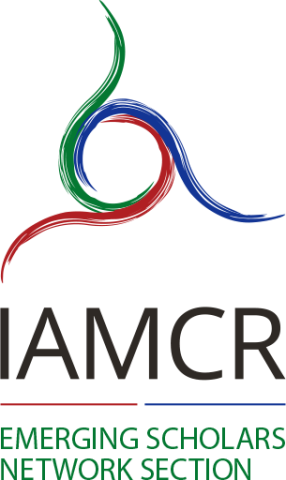
The Emerging Scholars Network Section (ESN) of the International Association for Media and Communication Research (IAMCR) invites the submission of proposals for papers and panels for IAMCR 2024, which will be held in Christchurch, New Zealand, from 30 June to 4 July 2024.
The deadline for submission is 7 February 2024, at 23h59 UTC.
The Emerging Scholars Network welcomes proposals from early career scholars that address the section’s interests in communication research that promotes universal values of solidarity, equality, and respect. As a section dedicated to the support and development of emerging scholarship, our section welcomes works in progress, work that creates frameworks for new ideas in research and teaching, and panels and special sections addressing publishing, mentoring, academic work and academic jobs, innovative research methodologies, and language barriers in academia.
See the CfPs of all sections and working groups
Theme
IAMCR conferences address many diverse topics defined by our 33 thematic sections and working groups. We also propose a single central theme to be explored throughout the conference with the aim of generating and exploring multiple perspectives. This is accomplished through plenary and special sessions, as well as in some of the sessions of the sections and working groups.
The 2024 central theme is Whiria te tāngata / Weaving people together: Communicative projects of decolonising, engaging, and listening.
Whiria te tāngata, weaving people together in English, is a Māori proverb (whakataukī) about the strength that comes through common purpose. The whakataukī highlights multiple issues that we invite conference participants to explore.
- It invites analysis of commonality in mediated communication, given the weaker power of place-based mass media, the rise of algorithmic culture, the challenges of engaging with difference in multicultural contexts and the crises facing neoliberal globalisation.
- The use of a Māori proverb also invites particular attention to analysis of indigenous communication and other attempts to challenge or rework colonial structures.
- More broadly, the theme invites reflection on the terms and models appropriate to describe contemporary communication, including the political and moral goals embedded in them. It therefore also points to alternative ways of theorising or evaluating communication alongside dominant imaginaries such as the public, and of the colonial and gendered histories that are part of those imaginaries.
- Weaving emphasises the agency of the communicator and directs attention to the valuing of communication as a project or skill, whether that is focused on social change, community or economic gain.
- Weaving also reminds us of the goal of a conference to build common purpose amongst participants.
Emerging Scholars are invited to submit abstracts related to these central themes as well as to other thematic areas of interest to the section, including community media; media, protest, and activism; media and education; media and identity (including gender, LGBTQ2+, ethnic and racial identity; and indigenous media); and communication policy and governance.
Guidelines for abstracts
Abstracts are requested for papers to be presented in person at the conference in Christchurch. Abstracts submitted to the Emerging Scholars Network Section should have between 300 and 500 words and must be submitted online here. Abstracts submitted by email will not be accepted.
The deadline to submit abstracts is 7 February 2024, at 23.59 UTC.
It is expected that each person will submit only one (1) abstract. However, under no circumstances should there be more than two (2) abstracts bearing the name of the same author, either individually or as part of any group of authors. The same abstract, or a version with minor variations in title or content, must not be submitted to more than one Section or Working Group. Such submissions will be deemed to be in breach of the conference guidelines and will be rejected by the abstract submission system, by the Head of the Section or Working Group or by the Conference Programme Reviewer. Authors submitting the same work to multiple Sections or Working Groups risk being removed entirely from the conference programme.
Proposals are accepted for both single papers and for panels with several papers (in which you propose multiple papers that address a single theme). Please note that there are special procedures for submitting panel proposals.
Joint sessions
The Emerging Scholars Network (ESN) works proactively to organise joint sessions with other sections and to provide experienced discussants for our sessions. This year, ESN will host joint sessions with the Communication, Policy, and Technology Section (CPT), the Environment, Science, and Risk communication Working Group (ESR), and with the Community Communication and Alternative Media Section (CAM).
These joint sessions provide an intentionally mentorship-oriented space and enable early career scholars to engage with both the ESN and another section dedicated to a specific topic.
If you would like to be included in one of the joint sessions submit your abstract to ESN and identify the panel in the title of your submission (e.g. Title of Paper - A Submission to the CAM/ESN Joint Session).
See important dates and deadlines to keep in mind
Evaluation criteria
Submitted abstracts will generally be evaluated on the basis of:
- Technical merit
- Readability
- Originality and/or significance
- Use of or contribution to theory
- Relevance to the section
Languages
Abstracts in English, French or Spanish are welcome. Presentations are also welcome in any of the three languages, but we recommend researchers to prepare their slides in English to facilitate comprehension and discussion.
See resources for IAMCR conference preparation and participation
For further information about the Emerging Scholars Network Section, its themes, submissions, and panels please contact the section co-chairs:
Steph Hill
steph.hill@ryerson.ca
Wafa Khalfan
Wafa.Khalfan@Sharjah.ac.ae